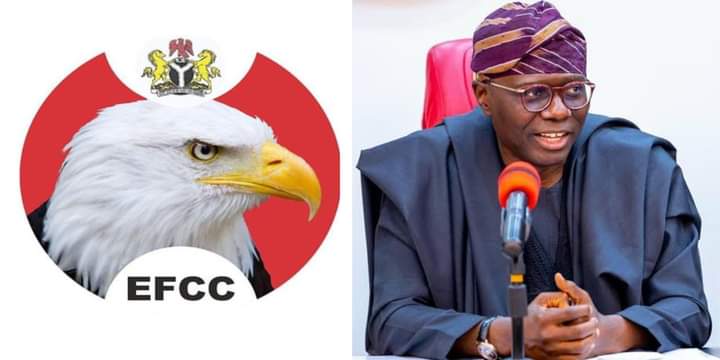Sanwo-olu Sues EFCC over fear of arrest, prosecution after his tenure
Governor Babajide Sanwo-Olu of Lagos State has taken legal action against the Economic and Financial Crimes Commission (EFCC), alleging that the commission is threatening to arrest, detain, and prosecute him once he completes his tenure.
Sanwo-Olu, represented by his lawyer Darlington Ozurumba, filed a fundamental rights enforcement suit in the Federal High Court in Abuja, presided over by Justice Joyce Abdulmalik.
The case, which was called for mention on Tuesday, saw Ozurumba inform the court that an updated originating summons had been filed, replacing an earlier one. “The anti-graft agency has been duly served with the latest court documents,” Ozurumba said.
However, EFCC’s counsel, Hadiza Afegbua, responded, noting, “I have yet to see the documents,” indicating that proof of service was not on record. Consequently, Justice Abdulmalik adjourned the hearing until November 11 for further mention.
In the originating summons, marked FHC/ABJ/CS/773/2024, dated and filed on June 6, Sanwo-Olu presented seven questions and requested 11 legal reliefs from the court. Central to his claims is a request for a declaration affirming his constitutional right to privacy.
“The plaintiff, as a citizen of Nigeria, is entitled to the right to private and family life, as a minimum guarantee encapsulated under the Constitution of the Republic of Nigeria, 1999,” the summons reads.
The governor further asserted his entitlement to acquire, own, and manage property, including bank accounts, both during and after his tenure, under Sections 43 and 44(1) of the 1999 Constitution.
Additionally, Sanwo-Olu argued that any investigation, arrest, or detention threatened by the EFCC during his tenure would be unconstitutional, stating that such actions “constitute a flagrant violation of his fundamental right to personal liberty and freedom of movement” under Sections 35(1) and (4) and 41(1) of the Constitution.
The governor is also asking the court to consider the alleged harassment and threat of arrest by the EFCC as politically motivated. “This constitutes a misuse of executive powers and an abuse of public office,”
Sanwo-Olu argued, describing it as an infringement on his rights to personal liberty, fair hearing, and equal protection under the law, as guaranteed by both the Nigerian Constitution and the African Charter on Human & Peoples’ Rights, CAP A9 LFN 2004.
Among his requests, Sanwo-Olu is seeking an order restraining the EFCC from “harassing, intimidating, arresting, detaining, interrogating or prosecuting him” in relation to his actions as Lagos State governor.
He is also asking the court to prohibit the EFCC from seizing his assets, international passport, or those of his family members, and from freezing their bank accounts.
Furthermore, he seeks protection from any form of invitation, arrest, or detention related to his tenure, insisting these acts would infringe upon his rights to personal liberty, privacy, and property ownership.
In a supporting affidavit filed by Martha Kanu, a litigation secretary with Sanwo-Olu’s law firm, Kanu claims that the EFCC is allegedly making covert plans to arrest the governor’s aides and family members, citing “false and spurious allegations of fund diversion.”
She added, “Officials of the commission are mounting pressure on the governor’s aides to make incriminating statements against him.”
Kanu also alleged that the EFCC has extended its pressure to contractors engaged with Lagos State projects, compelling them to implicate Sanwo-Olu in corruption.
“In a malicious attempt to target the plaintiff, some political adversaries, in collaboration with certain officials of the defendant, are falsely associating the plaintiff’s administration with non-existent corrupt practices,” she claimed.
According to her, EFCC officials are “inventing false, spurious, and malicious allegations” as a means to justify investigations and potential prosecution once the governor exits office.










Add Comment